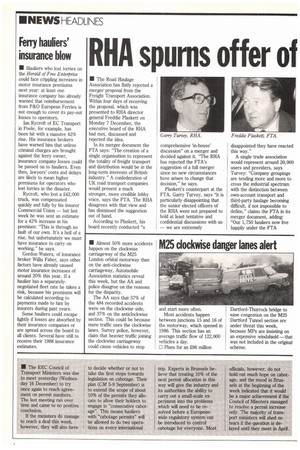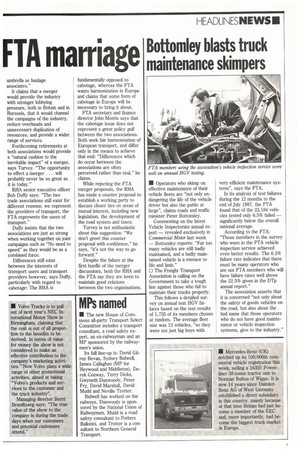RHA spurns offer of FTA marriage
Page 6

Page 7

If you've noticed an error in this article please click here to report it so we can fix it.
• The Road Haulage Association has flatly rejected a merger proposal from the Freight Transport Association. Within four days of receiving the proposal, which was presented to RHA director general Freddie Plaskett on Monday 7 December, the executive board of the RHA had met, discussed and rejected the idea.
In its merger document the FTA says: "The creation of a single organisation to represent the totality of freight transport and distribution would be in the long-term interests of British industry." A confederation of UK road transport companies would present a much stronger, more credible lobby voice, says the FTA. The RHA disagrees with that view and has dismissed the suggestion out of hand.
According to Plaskett, his board recently conducted "a comprehensive 'in-house' discussion" on a merger and decided against it. "The RHA has rejected the ETA's suggestion of a full merger since no new circumstances have arisen to change that decision," he says.
Plaskett's counterpart at the FTA, Garry Turvey, says "it is particularly disappointing that the senior elected officers of the RHA were not prepared to hold at least tentative and confidential discussions with us — we are extremely disappointed they have reacted this way."
A single trade association would represent around 20,000 users and providers, says Turvey: "Company groupings are tending more and more to cross the industrial spectrum with the distinction between own-account transport and third-party haulage becoming difficult, if not impossible to define," claims the FTA in its merger document, adding. "Our 1,750 hauliers now live happily under the FTA umbrella as haulage associates."
It claims that a merger would provide the industry with stronger lobbying pressure, both in Britain and in Burssels, that it would channel the campaigns of the industry, reduce overheads and unnecessary duplication of resources, and provide a wider range of services.
Forthcoming retirements at both associations would provide a "natural cushion to the inevitable impact" of a merger, says Turvey. "The opportunity to effect a merger . . . will probably never be so great as it is today."
RHA senior executive officer Bob Duffy says: "The two trade associations still exist for different reasons; we represent the providers of transport, the FTA represents the users of transport."
Duffy insists that the two associations are just as strong when working together on joint campaigns such as "No need to speed" as they would be as a combined force.
Differences still exist between the interests of transport users and transport providers however, says Duffy, particularly with regard to cabotage: The RHA is fundamentally opposed to cabotage, whereas the FTA wants harmonisation in Europe and claims that some form of cabotage in Europe will be necessary to bring it about.
FTA secretary and finance director John Morris says that the cabotage issue does not represent a great policy gulf between the two associations. Both seek fair harmonisation of European transport, and differ only in the means to achieve that end: "Differences which do occur between the associations are often perceived rather than real," he claims.
While rejecting the FTA merger proposals, the RHA has made a counter proposal to establish a working party to discuss closer ties on areas of mutual interest, including new legislation, the development of the road system and taxes.
Turvey is not enthusiastic about this suggestion: "We don't greet this counter proposal with confidence," he says, "it's not the way to go forward."
Despite the failure at the first hurdle of the merger discussions, both the RBA and the FTA say they are keen to maintain good relations between the two organisations.
















































































